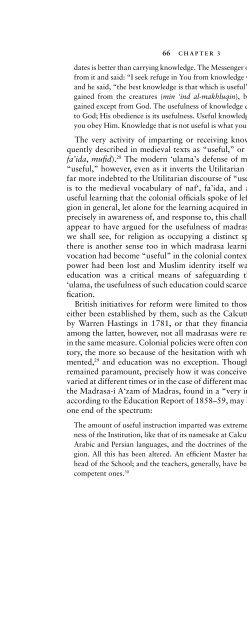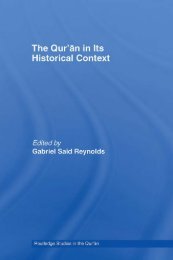Download (1 MB) - Islam and Christian-Muslim Relations: Articles ...
Download (1 MB) - Islam and Christian-Muslim Relations: Articles ...
Download (1 MB) - Islam and Christian-Muslim Relations: Articles ...
You also want an ePaper? Increase the reach of your titles
YUMPU automatically turns print PDFs into web optimized ePapers that Google loves.
66 CHAPTER 3dates is better than carrying knowledge. The Messenger of God sought refugefrom it <strong>and</strong> said: “I seek refuge in You from knowledge which is not useful”;<strong>and</strong> he said, “the best knowledge is that which is useful”. Knowledge can begained from the creatures (min ‘ind al-makhluqin), but usefulness is notgained except from God. The usefulness of knowledge consists in obedienceto God; His obedience is its usefulness. Useful knowledge is that with whichyou obey Him. Knowledge that is not useful is what you disobey Him with. 27The very activity of imparting or receiving knowledge was also frequentlydescribed in medieval texts as “useful,” or as a “benefit” (naf‘,fa’ida, mufid). 28 The modern ‘ulama’s defense of madrasa education as“useful,” however, even as it inverts the Utilitarian scale of priorities, isfar more indebted to the Utilitarian discourse of “useful learning” than itis to the medieval vocabulary of naf‘, fa’ida, <strong>and</strong> al-‘ilm al-nafi‘. Theuseful learning that the colonial officials spoke of left little room for religionin general, let alone for the learning acquired in the madrasa. It wasprecisely in awareness of, <strong>and</strong> response to, this challenge that the ‘ulamaappear to have argued for the usefulness of madrasa education <strong>and</strong>, aswe shall see, for religion as occupying a distinct sphere in society. Butthere is another sense too in which madrasa learning <strong>and</strong> the ‘ulama’svocation had become “useful” in the colonial context. Now that politicalpower had been lost <strong>and</strong> <strong>Muslim</strong> identity itself was at stake, religiouseducation was a critical means of safeguarding that identity. To the‘ulama, the usefulness of such education could scarcely need a better justification.British initiatives for reform were limited to those madrasas that hadeither been established by them, such as the Calcutta Madrasa foundedby Warren Hastings in 1781, or that they financially supported. Evenamong the latter, however, not all madrasas were reformed, or reformedin the same measure. Colonial policies were often confused <strong>and</strong> contradictory,the more so because of the hesitation with which they were implemented,29 <strong>and</strong> education was no exception. Though the idea of reformremained paramount, precisely how it was conceived or carried throughvaried at different times or in the case of different madrasas. The reform ofthe Madrasa-i A‘zam of Madras, found in a “very inefficient condition”according to the Education Report of 1858–59, may be taken to representone end of the spectrum:The amount of useful instruction imparted was extremely limited. The businessof the Institution, like that of its namesake at Calcutta, was teaching theArabic <strong>and</strong> Persian languages, <strong>and</strong> the doctrines of the Mahommedan religion.All this has been altered. An efficient Master has been placed at thehead of the School; <strong>and</strong> the teachers, generally, have been replaced by morecompetent ones. 30



